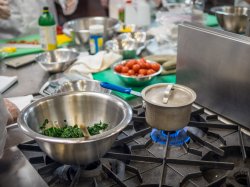The BS in Nutrition and Food Science with concentration in Food Science prepares students for careers in the food and beverage, agricultural, and processing industries as well as food regulatory agencies such as the U.S. Food and Drug Administration (FDA) and U.S. Department of Agriculture (USDA). Food science is a multidisciplinary field with the overarching goals of improving the safety and quality of food products, developing new food products, and designing new, safer and more energy-efficient food preservation methods. Food scientists strive to improve the microbial and chemical safety of foods as well as to enhance the quality of foods through traditional and emerging technologies.
Students in the Food Science concentration will gain in-depth knowledge of the physical, chemical and biochemical nature of food and the standards of nutritional processing, safety, food quality and food security and develop their aptitudes in areas such as food processing, food accessibility, food quality, food safety, food sensory experiences and food regulations.
Private industry has increased its demand for food scientists because their expertise is necessary for developing healthy food products and increasing crop yields, along with assuring quality and safety. Research in food genomics and agricultural sustainability is also expected to increase the number of available food science positions. Also, many food scientists are expected to retire in the next 10 years, creating even more job availability in private industry and regulatory agencies such as the FDA and USDA.
Graduates from the Food Science concentration can pursue careers in the following areas:
- Food Science — Food scientists are involved in the development of new food products, the design of processes to produce these foods, the choice of packaging materials, shelf-life studies, sensory evaluation of products using panels of potential consumers, and microbiological and chemical testing. Food scientists may also study more fundamental phenomena that are directly linked to the production of food products and their properties.
- Quality Assurance — Food quality assurance professionals are responsible for ensuring that food is acceptable to consumers by assessing texture, flavor, federal grade standards (e.g., of eggs),external factors such as size, shape, color, gloss, consistency, texture, and flavor, and internal factors (chemical, physical, microbial).
- Food Chemistry — Food chemists are responsible for the study of chemical processes and interactions of all biological and non-biological components of foods such as meat, poultry, lettuce, beer, and milk, to name a few. The work of a food chemist is similar to that of a biochemist in that it involves carbohydrates, lipids, and protein, but it also involves water, vitamins, minerals, enzymes, food additives, flavors and colors.
- Product Development — Food product development specialists are responsible for the complete process of bringing a new food product to market, whether that product is tangible or intangible (such as a service or experience). There are two parallel paths involved in the new product development process: one involves idea generation, product design, and detail engineering; the other involves market research and marketing analysis.
- Food Processing and Production — Processing and production specialists are responsible for the transformation of raw ingredients into food or of food into other forms. Food processing and production specialists typically take clean, harvested crops or butchered animal products and use these to produce attractive, marketable products with long shelf-life.
- Management — Food corporation executives manage all phases of a food company including production, food quality, food safety and sales.
- Food Safety — Food safety inspectors within federal regulatory agencies establish and enforce regulatory requirements to implement food safety laws governing domestic and imported raw and processed meat, poultry, and egg products, develop labeling requirements for foods, and educate consumers about safe food handling, food labeling and food defense.
- Research and Development — Food research and development specialists conduct investigations with the intent of making a discovery that can either lead to the development of new products or procedures or to the improvement of existing products or procedures.
- Sensory Analysis — Sensory analysts measure, analyze and interpret reactions to the characteristics of food and materials as they are perceived by the senses of sight, smell, taste, touch and hearing.
- Market Research — Market researchers systematically gather and interpret information about individuals or organizations using statistical and analytical methods and conduct social and opinion research to support corporate decision-making.
